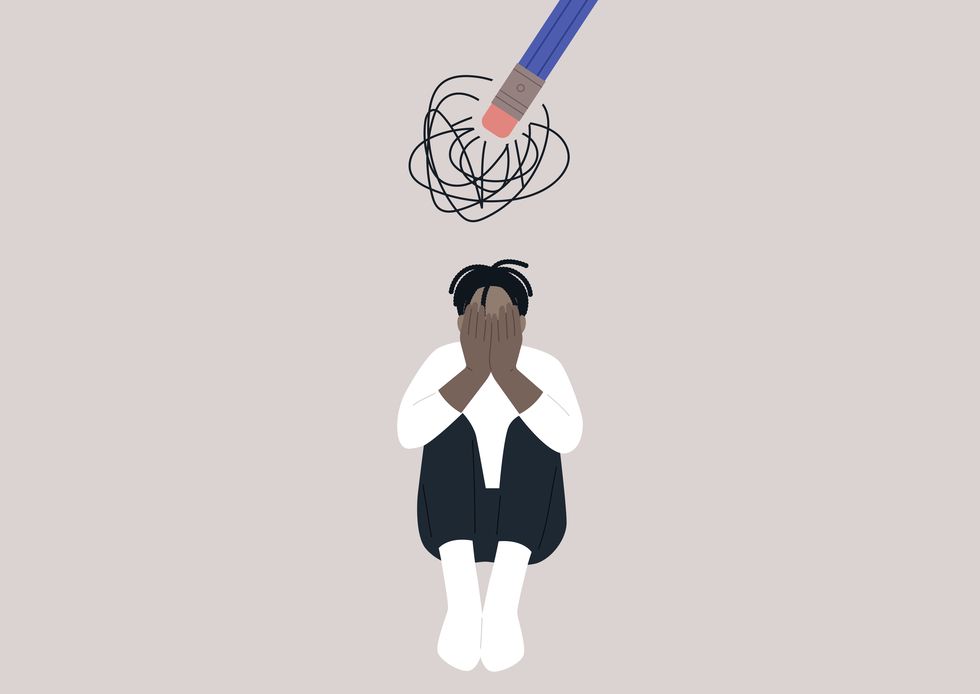In the Shondaland series The Magic of Moving Forward, we’re bringing you forward-thinking stories that illustrate how moving on from something is a way to level up. From women finding joy by throwing themselves divorce parties to vulnerable tales about entering new friendships and relationships, to discovering pleasure in life after giving up a bad habit — there’s no one way to flip the page and find happiness all over again.
In 2003, Catherine Bosley, a news anchor in the Cleveland area, found herself in the middle of a scandal so big, she was the subject of segments on everything from Good Morning America to David Letterman’s Top Ten list and beyond. “I turned down The Oprah Show … twice. Who does that?” she tells Shondaland.
After hearing that she had successfully beaten a life-threatening illness via a course of experimental drug therapy, she and her husband went to Key West, Florida, to celebrate. Bosley walked into a bar and, high on her new zest for life, ended up climbing onstage and partaking in a wet T-shirt contest. “I got a second chance, and I’m going to go do things I would have never done before,” she told herself. Little did she know, the event was being filmed by a Girls Gone Wild-type website, which would go on to sell the footage on their website.
The video was passed all over town, and Bosley was soon punished for what she refers to as “a moment of weakness, of stepping out of character.” She was fired from the TV position she had worked her entire life to land, went into a period of intense self-loathing, and even began having suicidal thoughts. Then, with a combination of faith, family, friends, and a series of lawsuits, Bosley was able to move past the event and get back into working in television news. She’s since given keynote speeches on the topic of overcoming scandals, a TED Talk, and wrote a book about her experience titled Forever and for All to See: How to Avoid a Social Media Scandal and How to Survive One.
Bosley is living proof that with enough dedication and by making the right moves, you can absolutely recover from a scandal. Maybe you won’t find yourself in something as salacious as the situations many of your favorite celebrities find themselves in. But should you find yourself in the middle of a scandal, big or small, here are some steps to take to get back on course.
How people find themselves in scandals
When we think of scandals, we often think of huge incidents like the T.J. Holmes and Amy Robach GMA3 host affair, or Will Smith slapping Chris Rock onstage at the Oscars. Scandals, however, can stem from far smaller things. And these are the types of everyday faux pas the average person can find themselves wrapped up in. “The reality is, no one thinks it can happen to them, until it does,” says Bosley. “All it takes is an unfortunate choice caught on camera, a poorly worded post, or misinterpreted text or email for the online world to turn a real-life world upside down.”
LaToya Evans, a crisis communications expert with the national public relations firm LEPR, says ultimately scandals can either happen to you or you cause them, with intent or even entirely by accident. “Scandals that happen to you are situations that you may be unknowingly involved in — like being involved with people or companies with their own misdeeds [e.g., Kim Kardashian and Balenciaga, or celebrities and cryptocurrency lawsuits],” she says. “You could find yourself working for a company that has been accused of fraud if you’re a senior executive or are involved with a bad business or romantic partner who has been accused of misdeeds. A scandal can also stem from something that you cause purposely or inadvertently, including things like substance abuse, cheating, embezzlement, and even car accidents,” which, Evans stresses, also happen to affect everyday people as well as celebrities. “And what many others are also now experiencing is cancel culture,” she adds. “Everyday people have brushes with cancel culture, often when people in their communities disagree with something they’ve done or may say online.”
The good news, says Evans, is it’s almost always possible to recover from a scandal or crisis. Here are some tips on how to handle the aftermath of one:
Assess the information
Evans says to take inventory of what is being said, and where and to whom. What is the risk of this audience, and does it directly affect you — for example, is it social media bashing on a private page? Is it being shared? Is it an article in the newspaper where everyone in your community will see it? From there, ask yourself if you owe anyone an apology. Or do you need to clarify inaccurate information? “These are important things to distinguish,” she says.
It’s also important, says Evans, not to let your emotions get a hold of you. “Most people’s instinct is to respond to the allegations and accusations immediately,” says Evans. This, however, may not always be the best idea, as there’s almost always more information that needs to be gathered before making a thoughtful response. “You would also want to make sure that when you do respond — if responding is the right thing to do — you address the most damaging of the claims,” she says. It’s also important to know that some may not even be worth addressing. Most importantly, take a breather, and process before you react. “You should never feel forced to immediately speak out or respond to allegations or accusations, especially while in an emotional state,” Evans adds. “An internet debate is also never a good idea, and those should be avoided.”
Gather your team
If you have the support of a lawyer or publicist already, Evans says to consult them first. If not, she does suggest hiring experts in these areas. “Often, law firms can help with PR recommendations as well,” she explains. Contact your employer’s HR department if you believe the scandal or chatter could affect your employment or have reason to suspect that others may be reaching out to your employer. You can also reach out to friends who are good in a crisis and put together your support team.
Decide whether and how to respond
“Understanding how widespread a situation is matters,” explains Evans. If it’s a social media scandal or conversation, she suggests choosing someone on your team to negotiate an apology or resolution. If it’s an article in the newspaper, you may want to release a statement distancing yourself, which you should provide directly to the newspaper instead of furnishing the information on social media.
If appropriate, apologize
“Assuming you did something that could be interpreted as problematic or unethical, acknowledge the mistake and apologize,” says Brad Chase, an independent PR consultant whose scope focuses on reputation management and crisis communications. Lawyers, he adds, may say never to apologize — and maybe you shouldn’t if there’s serious felonious behavior that’s being alleged — but most of the time, the hungry masses calling for your head are more likely trying to dehumanize you and shame you rather than put you in prison. “Don’t dress it up or try to sound smart. Literally say, ‘I’m sorry. I’m horrified and embarrassed,’” he says. If the facts are 100 percent unequivocally wrong, Chase says you can explain that right off the bat. “Don’t get defensive and write a novel explaining your every feeling and second-to-second movement; just lay out simple facts,” he says.
Keep it authentic
“That first apology sets the tone for everything that comes after,” adds Chase. “Even in this wild world of misinformation where most people don’t have the proper media literacy skills to understand nuance and context, everyone can smell your BS.” He says to write or speak from the heart. Have a friend read over a statement to proofread and give their thoughts on whether it hits the mark, but also read it aloud to them, and ask if it sounds like you. If it doesn’t, you’re going to be slammed for “handling” the situation rather than properly fixing things, Chase warns.
Expect some back-and-forth
“There’s likely going to be some back-and-forth, and maybe that first response will require an update,” says Chase. He reminds clients of the need for speed and brevity in follow-up messages.
Put actions behind your words
Often in a scandal or crisis, you will still have to change some actions. “If it’s a substance abuse issue, are you going to counseling or rehab? For cheating, are you going to marriage counseling?” asks Evans. It’s important, she says, to actually do those actions and communicate them in an effective way for the scandal’s audience.
Report untrue information online
If someone posts something about you online that is untrue, report it to the service provider. “So, if someone’s lying about whatever on Facebook, use all of their privacy controls, and take a screenshot of the post,” says Kate Gardiner, CEO and founder of Grey Horse, a feminist communications firm in New York City. Sometimes this can help to get someone’s account suspended or an untrue post taken down. She also says that in the middle of a personal crisis, it can be a good idea to make your social accounts private and/or take inventory of what you have currently displayed on your public-facing pages.
How to avoid a scandal
First and foremost, in today’s digital age, it’s important to monitor what you put online. Bosley says to keep in mind that if you send out a tweet, even if you delete it or take it down, someone can make a screenshot and pass that around. She recommends asking yourself before you post something on social media, “Is this something I’d want my friends, family, or my priest to see?”
She also suggests putting your cell phone and technology away when you are emotional or drinking and staying away from social media in those moments.
“It’s best to understand the world is very sensitive now, and it doesn’t take much to experience cancel culture,” adds Evans. The great news is that unless the person attempting to cancel you is highly influential in your circle or audience where you conduct business, it’s unlikely to work, she reassures. “The odds of it blowing over are actually relatively high,” Evans adds.
As a rule of thumb, Evans says to be sensitive to all communities, especially communities of color and the LGBTQ+ community. “If you don’t know the politically correct way to engage, ask first, and be conscious about what’s said, particularly in writing,” she says. “Never put a joke that could be misconstrued in writing, whether it’s about a political affiliation or another person.” It’s also important to be aware that cameras are everywhere now, and the first thing people do when someone acts out of character or has a conflict is pull out their cell phone, which can become a viral video that haunts you for years. “Avoid things like public drunkenness, drug use, and the obvious things, especially in a climate where everything can be recorded and exist permanently,” Evans adds.
There is life on the other side
Bosley tells people in the middle of a scandal to remember that “this too shall pass. And you might find a stronger, wiser you on the other side, and a whole different perspective about how to navigate our world today.” A scandal, she adds, can also give you a narrative that adds something to the world. This is the way Bosley looks at her advocacy work of helping others to get through scandals of their own.
It’s also important to recognize that you’re not alone. “There are people like me who have situations like me,” Bosley says. “You see them on the news all the time.” People make mistakes that go viral on social media . They get sued. Janet Jackson had her Super Bowl wardrobe malfunction. And they have all been able to move on. Bosley is living proof. She’s thrilled to have been able to work her way back to the news desk and says that with determination, she was able to land an even better job than the one she was initially fired from for her past mistake.
Nicole Pajer is a freelance writer who has contributed to The New York Times, AARP, Woman’s Day, Parade, Men’s Journal, Wired, and Emmy Magazine. Follow her on Twitter @nicolepajer.
Get Shondaland directly in your inbox: SUBSCRIBE TODAY















